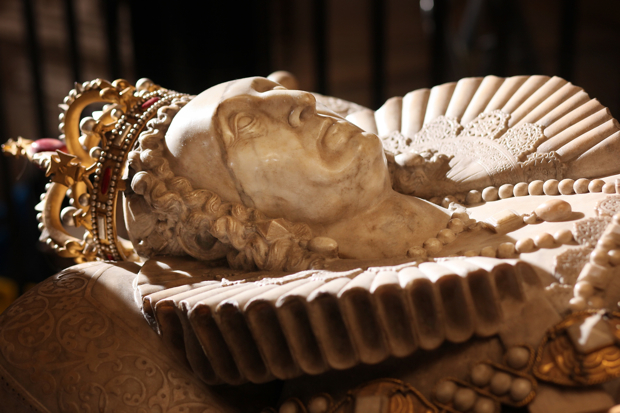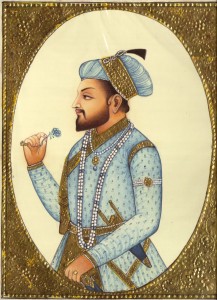Learn from Elizabeth I, Cameron: a named successor is a shroud
written for The Spectator, 24th March 2015

Elizabeth I could have taught David Cameron a thing or two about naming successors (Photo credit: Getty)
As Fraser Nelson says on this morning’s Spectator podcast, David Cameron will likely be regretting yesterday’s announcement for the rest of his premiership. He’s not a ripe watermelon; highlighting that he has a best before date won’t encourage anyone to eat him now, before he grows mould.
Worse, he’s announced a shortlist of three possible successors: ‘the Theresa Mays, and the George Osbornes, and the Boris Johnsons’. We all know the troubles a similar announcement caused Tony Blair, but even if Dave managed to sleep through the Blair-Brown years (from the opposite green benches), dipping into the biography of any pre-modern English monarch should have taught him of the dangers of naming a successor. Elizabeth I wouldn’t even name a successor on her deathbed. Under absolute monarchs, even speculating about the eventual death of a monarch was an act of treason – Elizabeth herself got into hot water, as merely the heir to the throne, when it was alleged she’d hired the occultist John Dee to cast Mary I’s horoscope. Dee was arrested and sent to the Tower. In casting his own political horoscope, Cameron has encouraged us all to think about Life After Dave (which I shall henceforth be calling LAD). With a king like this, who needs traitors?
We have Elizabeth herself to thank for the best explanation of why leaders are – and should be – so reluctant to publicly contemplate their own shelf life. In her sister Mary’s reign, she’d been linked to all manner of plots to depose the queen, despite never being successfully implicated: she famously scratched on a window of one prison, ‘much suspected of me, nothing proved can be’. Her acute political paranoia, and the trauma of being imprisoned in the Tower of London, stayed with her for the rest of her life. So in 1561, when the Scottish Ambassador pressed her to name the Queen of Scots, another Mary, as her heir she replied:
Think you that I could love my winding-sheet? Princes cannot like their own children, those that should succeed unto them… I know the inconstancy of the people of England, how they ever mislike the present government and have their eyes fixed upon that person that is next to succeed. More men love the rising sun than the one that sets.
I have good experience of myself in my sister’s how desirous men were that I should be in place, and earnest to set me up. And if I would have consented, I know what enterprises would have been attempted to bring it to pass.
In naming three potential successors, Cameron hasn’t just cut the cloth of one winding-sheet, (a coffin shroud), but three. Perhaps he’d like to try each coffin on for size, too? In 2015, as in 1561, every Englishman ‘ever mislikes the present government’, and for the Tory membership, the grass has been looking greener on the Boris Johnson side for sometime. By naming three potential successors, instead of one, Cameron may think that he’s diluted the threat. Instead, he’s just made leadership speculation official.

Emperor Shah Janan
This isn’t just a lesson Cameron could have learned from English history – over at the National Theatre, Dara currently dramatizes the decline of the Moghul Emperor Shah Janan, who ruled fifty years after Elizabeth, in India. As soon as it was announced his health was declining, his four sons started killing each other. Except that Shah Janan wasn’t even dead yet, and spent the next eight years of his life imprisoned by the victorious of the brothers, the Muslim supremacist Aurangzeb. This is the sort of fate that haunted Elizabeth: in her last days, when her councilors begged her to go to bed, she responded by rising from her chair to stand upright without moving or sitting for fifteen hours straight, just to show she could. The bureaucrat Robert Cecil, who was tasked by her council with ensuring a smooth transition, was eventually driven to claiming that in her last hour she’d made a mute and secret hand signal to him endorsing James VI of Scotland, Mary’s son. That’s almost certainly bogus – Elizabeth died, as she had lived, refusing to admit that such an eventuality might be possible.
And like Shah Janan, Cameron’s greatest mistake is to think he can name his successor, or that doing so will stifle dissent. He’s immediately alienated many of the 2010 intake by only naming the old-hands, instead of the younger generation (who will be less young by 2020). Already, the Telegraph is running a major profile talking up the merits of Nicky Morgan, one of the names left off the list, and has drawn up a list of not three, but seven other possible contenders. We’re now in for days of speculation as to why Cameron omitted the much-tipped Sajid Javid: does he really rate him less than has previously been briefed, or is this a cunning plan to secure the actual heir the status of the under-dog? Let’s give it about two weeks before Cameron is forced to clarify, on the record, whether his remarks really limited his chosen succession to Boris, George and Theresa, or whether they were just examples of the talent on offer. And he will gain nothing from being so boxed in. Perhaps then he’ll understand what Elizabeth meant – no prince can love living with his coffin.






